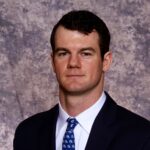PERC would like to congratulate Henry Holmes, recipient of the 2020 William S. Broadbent Family Graduate Fellow Award. This award is made possible by the generosity of the William S. Broadbent Family Endowment, which recognizes excellence within PERC’s Graduate Fellowship Program.
Henry Holmes is a J.D. Candidate (class of 2021) at Case Western Reserve University School of Law. Dr. Randy Rucker, a PERC Senior Fellow and Director of the Graduate Fellowship Program, selected Henry for this award noting his congenial and insightful contributions to PERC’s summer academic community, as well as the relevance and importance of his research to PERC’s mission to improve environmental outcomes through economically viable practices.
Henry’s fellowship research paper is titled: “Protecting Wetlands: Environmental Federalism and Grassroots Conservation in the Prairie Pothole Region.” The focus of Henry’s project was on the Trump administration’s recent reversal of the 2015 Clean Water Rule, which extended federal regulatory authority relative to earlier rules. His work examined how the change altered the way federal and state governments interact with private organizations in regards to wetland conservation. Insofar as reducing federal regulation over isolated wetlands reduces conflict between federal regulators and private landowners, private organizations can more effectively align economic incentives with voluntary conservation objectives. His work concludes with an examination of Ducks Unlimited, the world’s largest waterfowl and wetlands conservation organization, as a case study for successful private conservation and public-private action in the region. A summary of his research was recently published in the Winter 2019 PERC Reports, which highlighted efforts by Ducks Unlimited to protect duck habitat in the Prairie Pothole Region.
PERC’s Graduate Fellowship Program gives graduate and law students the opportunity to spend three months at PERC researching and writing a paper under the mentorship of a PERC Senior Fellow and visiting scholars. Topics include natural resources, innovative conservation techniques, property rights, and environmental issues. In addition, fellows are given the opportunity to attend summer seminars presented by scholars of diverse backgrounds, conservation professionals, and policymakers who can fast track graduate fellows’ research and career opportunities. This program is made possible by generous support from the Helen I. Graham Charitable Foundation.



